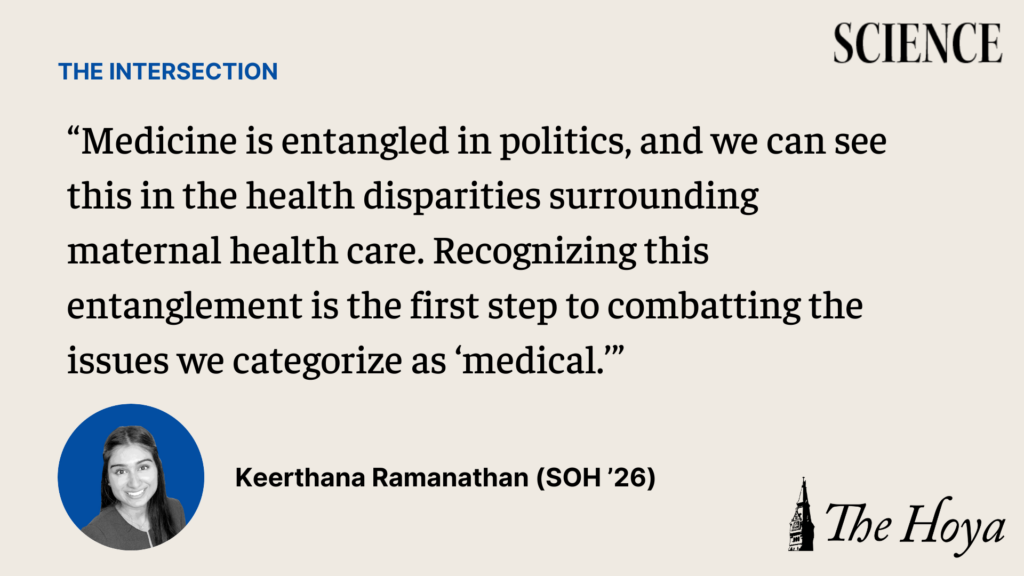Science is often mistakenly conflated with objectivity. Many believe that the very nature of science calls for an erasure of opinion, social issues and politics. After all, we are taught from an early age that science is meant to be objective, unbiased and unprejudiced.
The fact of the matter is that science is not always free from social influences, especially when it comes to medicine. Medicine is entangled in politics, and we can see this in the health disparities surrounding maternal healthcare. Recognizing this entanglement is the first step to combatting the issues we categorize as “medical.”
According to the Centers for Disease Control and Prevention (CDC), health disparities are “preventable differences in the burden of disease, injury, violence, or opportunities to achieve optimal health that are experienced by socially disadvantaged populations.”
Health disparities are largely driven by forces known as the social determinants of health, which are non-medical factors that can influence one’s health. They include the day-to-day conditions of an individual’s life, such as where they live, work and age, as well as larger forces and systems that govern our world, including policies, development agendas, social norms and political systems.
The social determinants of health largely revolve around a patient’s identity, including race, ethnicity, socioeconomic status, gender, religion and sexual orientation. They also shed light on the political nature of medicine, where structural inequalities follow individuals from womb to womb, through the generations.
We can see a prominent example of this in maternal health, which is often regarded as a key indicator of a healthcare system. In the United States, Black mothers in the United States are three to four times more likely to die during childbirth compared to white women, according to the CDC.
Similar disparities in maternal health are observed in Native American, Asian and Hispanic populations. The racial inequality that currently exists worldwide is largely tied to other social determinants of health, like socioeconomic status and education. College-educated Black women are three times more likely to experience severe complications in maternal health compared to a white woman without a high school diploma, according to a 2022 study.
The racial disparities that exist in maternal health find their roots deep in the history of American gynecology. Oftentimes referred to as the father of modern gynecology, James Marion Sims performed extensive experiments on Black enslaved women without their consent and without using anesthesia.
In addition, many people are not familiar with the origins of the cesarean section, one of the most common procedures in gynecology meant to promote maternal health. The procedure was tested on Black enslaved women, largely due to the misguided and racially prejudiced belief that Black individuals did not feel pain to the same extent as white individuals.
This unfounded perception lives on in the current U.S. healthcare system, as Black people are less likely to be given pain medication than white Americans. The pervasive racism that exists in healthcare has led to an association between racial discrimination and mistrust of providers, according to a study led by Brittany Chambers, an assistant professor of human development and family studies at the University of California, Davis.
The systematic dismissal of Black patients’ pain may further contribute to disparities in maternal healthcare, reinforcing the cyclical nature of healthcare inequality.
Both within and outside of maternal healthcare, society-based disparities undermine the very purpose of medicine. In a field riddled with inequality and bias, it is increasingly important to recognize the multidisciplinary nature of medicine, especially in terms of its relationship to politics.
Current providers, medical and pre-medical students alike must recognize the inequality present in the healthcare system. Without first acknowledging and then setting about fixing the intersection between science and society, we will only perpetuate the existing disparities we see in the medical field today.
Keerthana Ramanathan is a first-year in the School of Health. The Intersection appears in print or online every third Friday.









